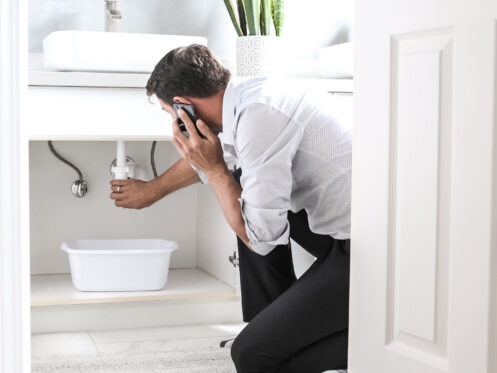Old buildings are artistic and beautiful, but they are often riddled with too many infrastructure issues such as aging pipes. If your plumbing system hasn’t been working as well as it used to, it may be time to consider a replacement. Here are the common signs to watch out for.
Discolored Water
Unless you are using well water or your community is under a boil-water order, discolored water coming from your pipes should be a great cause of concern. The reddish, brownish, or darkish tint you often see results from corrosion in your pipes.
Over time, the protective coating inside your pipes can wear off, allowing the corroded particles (rust) to mix with your water and cause the color change. You may also observe this sign when your home’s water source contains hard minerals like iron and manganese. Be sure to rule out other causes with the help of a professional.
Low Water Pressure
Old pipes made of galvanized steel corrode when oxidation builds up inside the pipe walls. The corroded particles will narrow the pathway of water, affecting its pressure.
This problem may also arise when your rusted old pipes eventually develop holes that lose water intended for your home. If this is the case, address it promptly because leaks are known to damage your house’s foundation and framing. Additionally, water leaks create a conducive environment for mold to thrive, leading to HVAC problems and poor indoor quality as well.
It is important to be aware of other causes of low water pressure, such as debris buildup in the pipes, meter valve issues, broken pressure regulators, and poor plumbing system installation. Consult with a plumber to find out the exact cause and address it effectively.
Strange Noises
Old pipes tend to produce weird sounds when you turn on your faucets and other water outlets. They rattle when the water flowing through them causes them to shake or when they are loose at the joints.
Knocking and banging noises, collectively referred to as “a water hammer,” indicate issues with water flow or pressure. When water suddenly stops (when you shut off a faucet or a valve), its momentum creates a pressure wave that travels through the pipes to cause a loud bang.
Houses built after the 1960s had hammer arrestors installed between water fixtures to prevent this. So, if you hear knocking and banging sounds, it means the arrestor has worn out with the pipes.
Whistling or squealing noises could mean the nuts, bolts, and washers holding your pipes together have degraded. Replacing them could easily solve the problem, but if your pipes are also old and worn out, installing a new plumbing system would be the best course of action.
Pipes in Visibly Poor Condition
Every once in a while, inspect the exposed parts of your pipes for signs of corrosion, flaking metal, bumps, and anything else that looks out of the ordinary. Also, check for pools of water under your pipes, leaks, and the presence of mold growth.
Consequences of Using Old Pipes
Compromised Water Purity
Old corroding pipes can leach harmful substances like rust, lead, and other contaminants into your water supply. You’ll first notice discoloration and unpleasant tastes, but over time, these particles can significantly impact your health and well-being.
Your young children may experience developmental delays and neurological damage. Other household members could suffer from gastrointestinal problems and skin irritations and may even develop cancer.
Recurring Repairs
Old pipes break down frequently, resulting in recurrent expenses when fixing them. The problem is that the issues will never stop occurring until you finally replace the entire plumbing system. Conduct a thorough cost analysis of the repair costs you have already incurred and the potential for future problems, along with the associated health risks, to make an informed decision when considering either replacement or further repairs.
Home Insurance Limitations
You may have to pay higher insurance interest if your home uses old pipes. Many policies have specific limitations regarding failing pipes or infrastructure issues caused by old plumbing systems. For example, insurance companies may refuse to cover gradual home damage, such as foundation rot or mold infestations, that is common with rusting or leaking pipes.
Rising Water Bills
Old pipes can also lead to unexplained increases in water bills. High monthly utility bills can cause considerable stress, especially when the underlying problem takes a while to detect and costs even more to fix.
Sewer Damage
If you have an old plumbing system and big trees nearby, you may also have to deal with sewer line issues. Big tree roots will seek out the new water source: leaking pipes. On their quest, they can burst sewer lines and the old pipes themselves, causing messy, smelly leaks.
Dealing With an Old Plumbing System
Professional Inspection and Evaluation
If you want to truly understand the state of your plumbing system, call for a professional inspection and evaluation. A plumber will carefully assess your pipes, fixtures, and other connections to identify areas that need special attention. They have the appropriate tools and expertise to detect hidden issues and potential risks to your home and general well-being.
Based on their finding and your unique circumstances, a plumber may advise you on how to proceed. If a repair can keep things running for a while as you prepare for a complete upgrade, they can give you the specific timeline and requirements to make the future installation process much more manageable.
Routine Maintenance
Aging infrastructure requires extra attention and care to keep working and to prevent potential hazards. If you used to conduct plumbing maintenance once every three to five years, you may now need to call a plumber more frequently to identify and address minor issues before they become major problems.
Modernize and Upgrade the Old System
While routine maintenance and repairs are important, if you want to enhance your home’s comfort, reduce utility bills, and avoid the risks associated with old pipes, it’s best to install a new plumbing system. Modern pipes are made of copper, chlorinated polyvinyl chloride (CPVC), and cross-linked polyethylene pipes (PEX). Copper contains no lead, is corrosion-resistant, lightweight, easy to work with, and durable. It is also less likely to break under stress because it is more flexible than galvanized steel and iron.
CPVC is also resistant to corrosion and can handle water temperatures up to 200°F. The chlorine treatment inhibits bacterial proliferation in the pipes. PEX, on the other hand, is perfect for small, tight spaces within the house. It is fully flexible, inexpensive, and less labor-intensive, hence easy to work with.
Modern plumbing systems also include faucets designed to reduce water wastage and improve convenience. For example, there are taps with sensors that automatically shut off after you finish washing your hands.
Call Delta Mechanical for More Information
Replacing your old plumbing system is a significant investment, but it has long-term health and financial benefits. So, you have to do it right. We also provide other services like repiping, water treatment, tankless water heater installation, and boiler maintenance.
If you live in Arizona, California, Florida, Texas, Colorado, or Nevada, call our team at Delta Mechanical for professional plumbing system installation.


